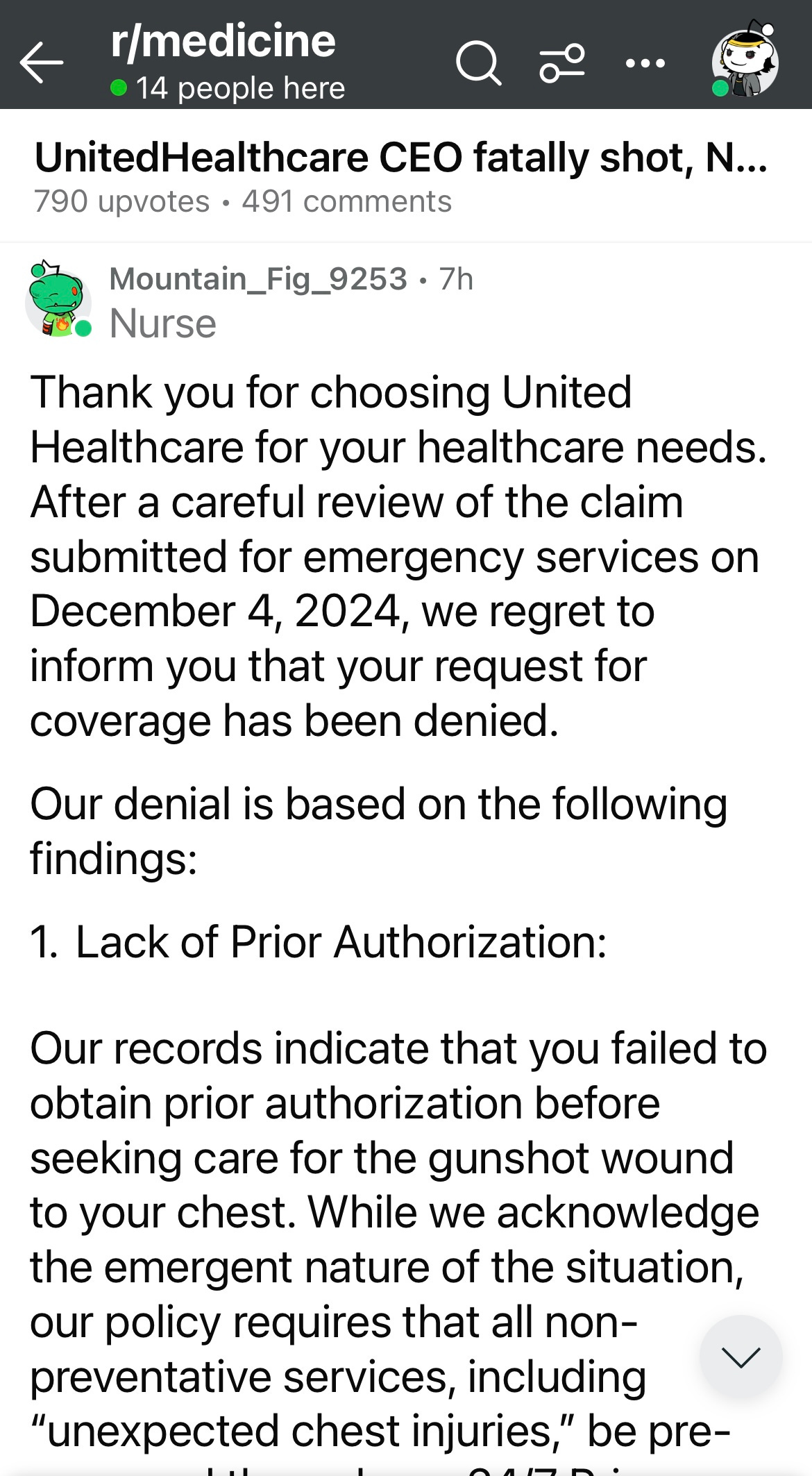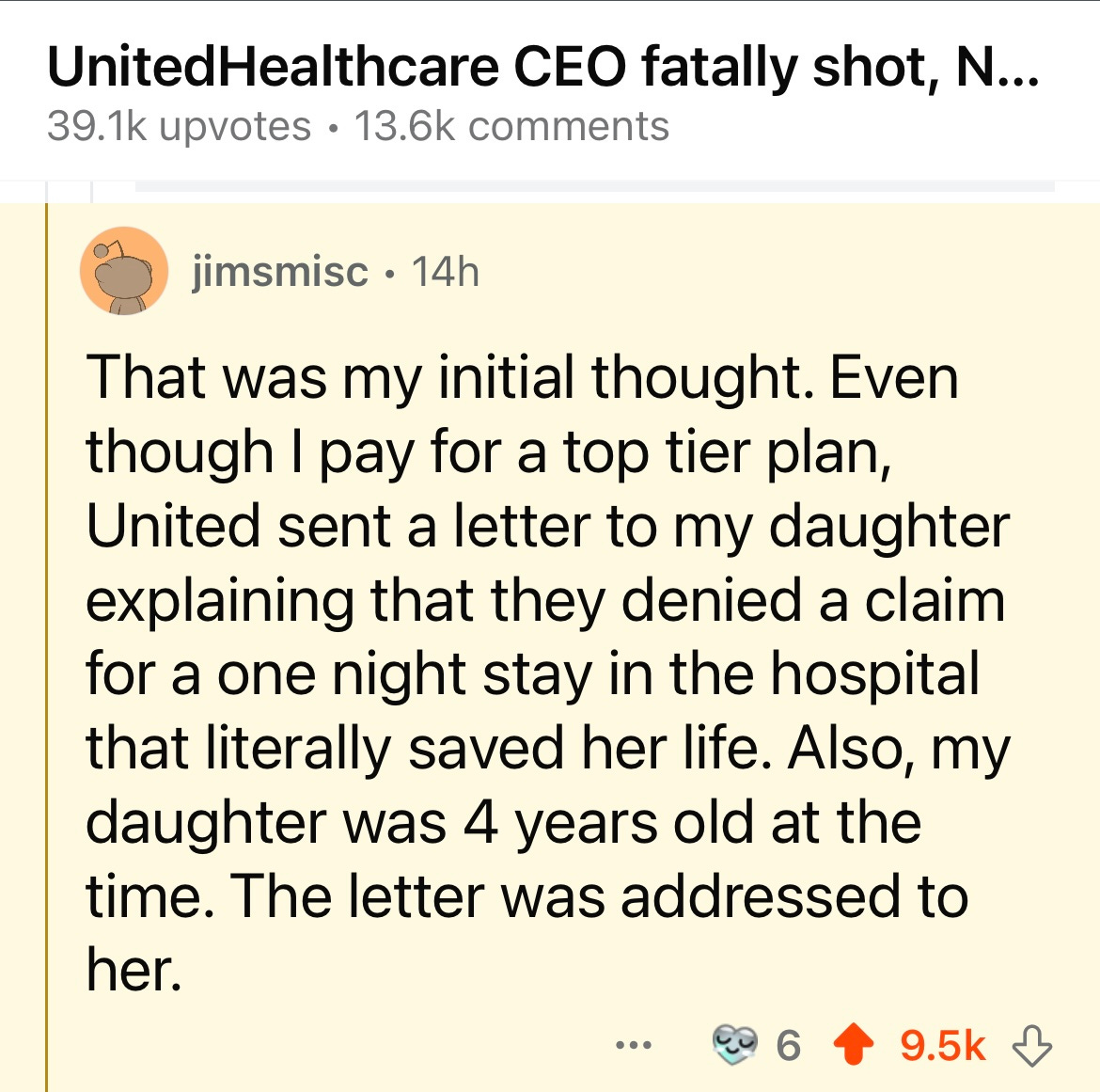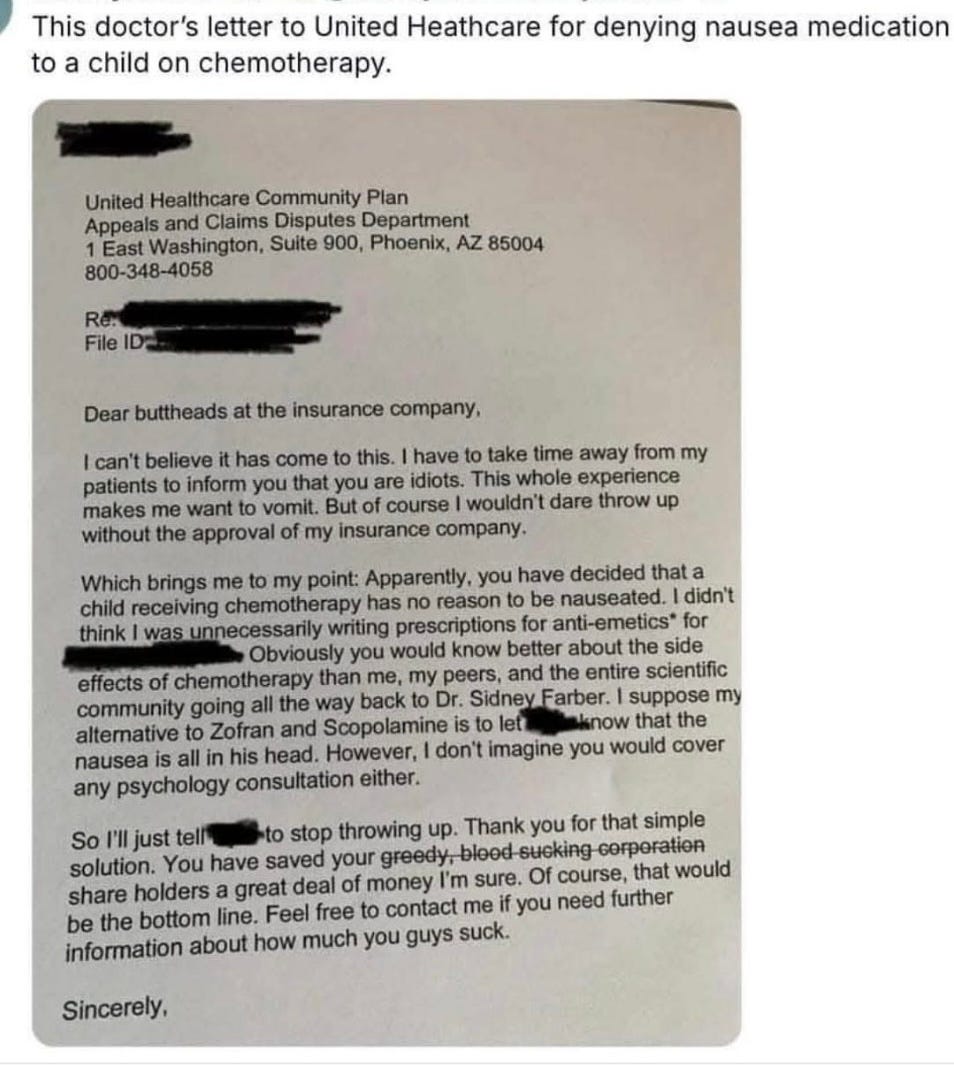On December 4, 2024, UnitedHealthcare CEO Brian Thompson was shot dead on a sidewalk in Midtown Manhattan while walking to an investor meeting. His murder appears to be a professional hit. The shell casings from the bullets that killed Mr. Thompson were inscribed with the words “Delay”, “Deny” and possibly “Depose”. There’s obviously been a lot of speculation as to the motive. My guess is that the assassin has long since fled for a country that has no extradition treaty with the United States. But that speculation is beyond my pay grade.
Watching the public reaction to Mr. Thompson’s murder, it appears that he had hundreds of millions of enemies. While I’m not a gambling person, my suspicion is that the motive for this assassination goes way beyond a disgruntled policy holder.
According to a class action lawsuit filed in US District Court in Minnesota, Mr. Thompson, along with two other United executives, sold off $120 million in stocks when they became aware, in October 2023, that the Justice Department would be re-opening an investigation into the company’s business practices. The announcement of the DOJ antitrust investigation was not made public until February, 2024. The class in this case is a Firefighters’ pension fund in Hollywood, Florida which claims that their beneficiaries suffered monetary damages because of the decline in the company’s stock after the February antitrust announcement. As it turns out, the Firefighters aren’t the only ones who are full of white-hot rage over the monetary damages inflicted by UnitedHealthcare. You can read more about the allegations of insider trading and the resultant lawsuit here.
In the wake of Mr. Thompson’s cold-blooded murder, there has been an outpouring of vitriol about his death. Everything from snark, to righteous indignation to macabre glee. With very little sympathy for his widow and the two children he left behind.
Watching the reaction to this murder has been a bit like watching the American public celebrate the slaughter of a gladiator in a digital Roman colosseum. The r/medicine Subreddit was so flooded with unsympathetic commentary, mostly from healthcare professionals, that the admins removed the thread. That didn’t stop The Daily Beast from running a story about what was being said in the digital doctors’ lounge.
I’ve been wrestling all week with my feelings about this murder and the social reckoning it seems to have sparked. I do not condone vigilantism, gun violence or murder. Frankly, I’m getting sick of hearing about American firearm deaths on a daily fv*king basis.
And…
I can hold space for the fact that this man’s life contributed to immeasurable suffering and death. To be clear, insurance companies like United aren’t in the business of healthcare. These are financial services institutions whose business model depends on extracting as much money as possible from human misfortune. In the marketplace of American medicine, human suffering is a commodity.
The entire American economy is dependent on money that flows from the for-profit healthcare industry. Pension funds and investment portfolios are packed with stocks in publicly traded healthcare companies. Millions of Americans stay in jobs they hate because they’re chained to the insurance policy funded by their employer. Medical conferences and educational institutions are funded by corporate profiteers. The campaign coffers of our political leaders are piled high with checks from these business entities, as well as the banks and investment firms that profit from them; ensuring that there will never be meaningful change to the atrocity that the United States passes off as a healthcare system.
Brian Thompson and his fellow health-finance industry executives are making a fortune by causing death, disability and bankruptcy on an unimaginable scale. But the magnitude of the problem goes far beyond one man’s greed. I suspect that this murder was meant to send a message to anyone who may be deposed in the Justice Department’s antitrust investigation. Provided that it even moves forward under the new administration. Which I also doubt. The tentacles of this monstrosity run deep.
Storytime…
My everyday existence revolves around the government sanctioned racketeering that is the American healthcare industry. Despite the fact that I practice under a transparent, membership-based model known as Direct Primary Care, I spend more than half of my clinical time helping families navigate the system to secure things like asthma inhalers, antibiotics, eczema creams and developmental services for children with special needs. Most of my patients are under 5 years of age. I’m fighting this government sponsored racket in order to give care to infants and children. Which is infuriating and demoralizing on a level that’s difficult to express.
The Doctor as Patient
In 2021, during the height of the COVID pandemic, I suffered a pathological femur fracture. Meaning that it happened out of the blue. I didn’t get into an accident or fall off of a roof. The fracture of one of the strongest bones in the body of a young adult is considered to be due to malignancy until proven otherwise.
I was initially misdiagnosed in the emergency department of a hospital where I had admitting privileges at the time. After the HCA-owned hospital took my insurance information and relieved me of an $800 out-of-pocket copayment, a mid-level “provider” ran a CT scan, gave me a shot of Dilaudid and informed me that I had sciatica. When I asked for an MRI, I was told “it takes an act of congress to get an MRI in the emergency department”. He told me to go home and “walk it off”.
Three days later, unable to walk at all, I ended up in a different hospital and demanded an MRI. As it turns out, my “sciatica” was a fracture which required surgery, biopsy and placement of a titanium rod into my femur. When I became disabled, my employer immediately stopped my paychecks, cut off my health and malpractice insurance without notice and told the office manager to refuse to sign my disability paperwork. Despite the fact that I was under contract and it’s against federal law to fire someone for becoming disabled.
Without health insurance or a paycheck, I wasn’t able to afford to go to outpatient physical therapy; a medical intervention that my surgeon recommended 3 times weekly at a cost of $120/hour. As a result of not having access to this care, I suffered a re-injury 7 weeks postoperatively. My femur shattered around the hardware and I went back into the OR to have a titanium rod inserted into my femur from my hip to my knee. And recovery started all over again.
From April through December of 2021, I was completely disabled. I didn’t know if I would ever work again or whether my life would be forever altered. After my attorney and I were able to get my COBRA health insurance coverage reinstated, I religiously went to physical therapy 3 times weekly. When I wasn’t at PT, I was walking laps in my community pool to build strength and endurance. Nearly 4 years later, I still have a deep, aching pain if I walk for longer than 45 minutes straight. The reason I row and do pole training is because things like running, hiking and even walking long distances are unavailable to me.
I have yet to financially recover from this medical crisis, which has also altered the trajectory of my career. But I’m comparatively lucky. I did have a disability insurance policy that kicked in after 90 days despite my former employer’s refusal to cooperate. That policy helped to keep a roof over my head and my bills paid while I learned to walk again. With the help of the Nevada Labor Commission and my saint of an attorney, I was able to get my health insurance reinstated through COBRA. But I drained my entire savings and maxed out 2 credit cards in order to cover my living and medical expenses until my disability insurance claim kicked in. If the same or a similar situation were to arise today, I would find myself among the hundreds of thousands of Americans who file for medical bankruptcy every year.
I’m offering all of this to explain how profoundly exhausted I am from practicing medicine in the United States. And I’m not the only one. Every year, 300-400 US physicians die by suicide. In part, because of the moral injury caused by watching patients suffer and die as a result of not being able to access medical care.
On December first, three days before the assassination of Brian Thompson, Dr. John Thomas (Buz) Giannini, Jr. chose to end his life. His death did not make headlines but it will ripple through the Alabama community where he served as a family physician. More collateral damage from the policies implemented by the corporate healthcare industry.
My truth is that, if given the means and opportunity, I would take care of patients for free. I consider my clinical instincts to be a gift. And I do a considerable amount of educational, advocacy and patient care work pro bono; including the content provided in this Substack.
But, unfortunately, my medical education was not free. It took 14 years and hundreds of thousands of dollars to become the clinician I am today. Given my injury, I would die with that medical education debt if it weren’t for national student loan forgiveness programs.
I have so much more to say about this and will continue to do so as I move into the next chapter of my professional development. As part of this mission, I’m offering interviews with other practicing physicians to highlight just how much we share patients’ frustration with the state of affairs. I am also planning to write a book about my awe-inspiring and soul-crushing journey through American medicine. If you appreciate the work I’m doing here, it would mean the world to me if you would consider becoming a paid subscriber. If you value this work and would prefer to make a commitment-free donation, you can do so here.
I hope you enjoy this week’s Under the White Coat interview with Wisconsin Family Medicine physician, Dr. Elizabeth King. We discuss our experiences practicing primary care as well as her experience as a newly diagnosed breast cancer patient.
















Share this post